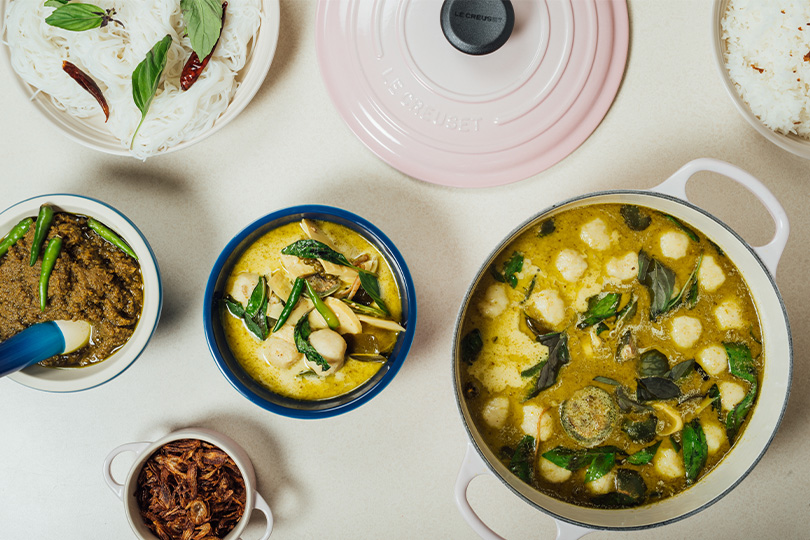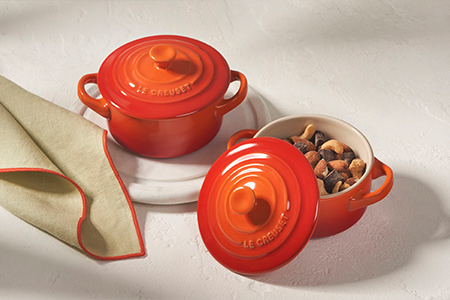Free shipping may exclude areas deemed remote by our carriers. Our Customer Service team will inform you of the price to ship your item when they process your request.
Fish Ball Green Curry
4.2 L Round Dutch Oven
Vegetables
Over 1 hour
6-8
RECIPE NOTES
Our Fish Ball Green Curry is the ultimate recipe when you’re feeling under the weather, incorporating a variety of rich herbs, spices, and flavours. Combining fish balls with Krueng Gaeng, also known as curry paste, this recipe is as colourful as the piece of cookware it will be prepared in.
The Round Dutch Oven creates the ideal environment for this recipe to come together, locking in heat and moisture until the curry paste infuses its flavours and aromatics evenly throughout the dish. This iconic piece of cookware has been carefully crafted to deliver superior heat retention due to its enamelled cast iron construction, making it perfect for cooking the curry low and slow.
Whether you are looking for a main course to shake things up in the kitchen, or simply want to experiment with different curry recipes, our Fish Ball Green Curry has you covered. This recipe can be prepared in just over an hour, serving between six and eight people at a time. Here are all the ingredients you’ll need along with the steps to follow before tackling this recipe!
INSTRUCTIONS
Krueng Gaeng (curry paste)
The ingredients for the curry paste must first be cut into small pieces to facilitate pounding or processing. It takes a few extra moments to chop everything by hand, but you’ll save a lot of time and effort if you use a mortar and pestle, not to mention your food processor’s motor.
Toast the dry spices in a pan and set aside. When the spices have cooled, grind them to a fine powder in a spice grinder, coffee grinder, or mortar and pestle. Set aside.
Working in batches, pound or grind all the wet ingredients (reserving the shrimp paste) into a paste. If you use a mortar and pestle, don’t expect to get a uniformly smooth paste; a few small pieces may remain without any problem.
Add the dry spices and shrimp paste and carefully mash or stir to combine with the paste.
Heat 4 tablespoons of oil in a heavy-bottomed pan or saucepan over medium heat. When the oil is hot, add the curry paste and fry, stirring constantly. As it cooks, the curry paste will begin to darken. Be careful not to burn it. If you need more oil, add a tablespoon at a time. Continue frying for about 7 minutes, until you have a nice separation between the oil and the curry paste.
Add the palm sugar and fry for another minute. Add the fish sauce and fry for another minute. The paste should now be quite dark, almost an olive green or persimmon colour. Set aside and let cool.
Curry
Pick the herbs and set them aside.
In a heavy-bottomed Dutch Oven, bring the coconut milk, cream, and water to a boil. Lower the heat to a simmer and add the curry paste (For a less spicy curry, start with half the curry paste. You can add more later if you find you need more kick, but you can’t take it away). Stir to combine, return to low heat, and add the bamboo shoots and fish balls.
Peel and quarter the eggplant; stir to combine. Keep simmering and continue cooking for about 5 minutes or until the eggplants have reached the desired doneness (in Thailand they would not be cooked through, they would still have some bite).
Continue to simmer, adding the fish sauce, palm sugar, makrut lime leaves, half the Thai basil, and sliced chilies.
Check the seasoning and add more fish sauce, palm sugar, or more curry paste to taste. The curry should be slightly sweet and salty, spicy, aromatic and fragrant, and peppered with the basil and makrut leaves. At this point, there should be a nice layer of green oil on top of the curry. This is desirable, and a telltale sign that the curry has been prepared properly.
Remove from the heat and let it sit for 10 to 15 minutes to allow all the flavours to blend well. This curry is usually eaten hot.
Serve with Kanom jeen (rice vermicelli noodles) or steamed Thai jasmine rice.
Recipe courtesy of Pumpui



